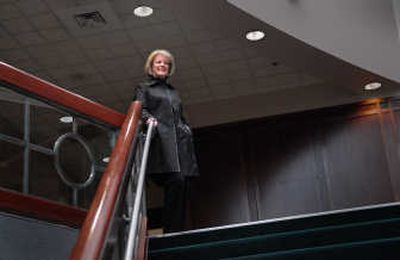Women of interest

Heidi Stanley, the newly elected president and CEO of Sterling Savings Bank, is the next generation.
Stanley is part of a leadership team that piloted a growth spurt that grew the bank from a start-up thrift into a commercial bank with $11.75 billion in assets.
Co-founders Harold Gilkey and William Zuppe have mentored their staff, and now Stanley is taking over the CEO and president role from Zuppe, who is retiring at the end of the year.
“They are letting us run the bank,” Stanley said. “They’ve been slowly but surely mentoring us and letting us do this for a long time.”
Stanley has been a driving force for Sterling, a bank that has retained its customer-friendly flavor while acquiring 21 other financial institutions and expanding into a half-dozen states with 171 branches.
Her accomplishments were recently recognized by U.S. Banker magazine, which ranked her 14th among the top 25 most powerful women in banking. She has made the list for three of the past five years. The magazine considered a pool of 4,800 women from banks nationwide, said Holly Straeel, editor-in-chief for the New York-based publication.
Stanley “is very, very clear in what she wants to do and aware of the challenges in her market,” Straeel said.
Sterling Savings Bank’s new CEO has also done well at keeping an ever-growing management team together as the bank brought newly acquired financial institutions on board.
Stanley credits the bank’s success to more than 3,000 employees and to other women, such as executive vice presidents Carol Mangan, head of commercial banking, Debbie Meekins, head of retail banking and portfolio manager Nancy McDaniel.
Mentors have played a strong role in her career, starting early on with strong women, including her mother and grandmothers, all college graduates.
The trip to New York for the U.S. Banker awards put Stanley in touch with other women in the industry, she said, women who shared their successes and their failures in hopes of helping others lead effectively.
Her journey to CEO began in 1985 when, as a customer of Sterling’s, she visited regularly for draws on a construction loan for a home she and her husband, Ron Stanley, were building.
The couple had just moved to back to Spokane so Ron Stanley could take over the family business, Empire Bolt. Harold Gilkey offered Heidi Stanley, who had just resigned from a position at IBM, a part-time job in public relations.
Stanley, who graduated from Washington State University with a degree in business administration, recalls having a can-do attitude but learned an important lesson when she needed to craft a news release on an acquisition one week after being hired.
“If you don’t know, it’s okay to say ‘I don’t know,’ ” said Stanley, who called an acquaintance in the financial institutions for advice.
Stanley, 51, said she never planned her career but rose through the ranks as a result of a passion for the job and a work ethic.
“When I was asked to do things, I did them and tried to do them well,” she said.
She learned from Gilkey that people look to leaders to open a new door every time one closes and to be steady at the helm, she said. Zuppe was the action-oriented executive who taught her to “just get it done.”
He also impressed upon her the importance of keeping everyone on board with Hometown Helpful, the company’s customer-focused business strategy.
“I really understand what that means,” Stanley said. “It’s cultural in our company. It’s who we are and it separates us from other financial institutions.”
She likens managing the large bank to balancing a three-legged stool with employees, customers and shareholders. Like any top professional there are days where there’s nary a moment to breathe, and a feeling on being “on the ragged edge” she said, but she has learned that moments of perfect balance come and go.
“Women who are in executive positions must find ways to feel good about who they are, what they do and how they allocate their time.”